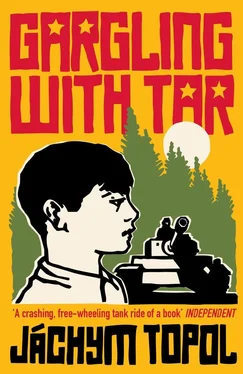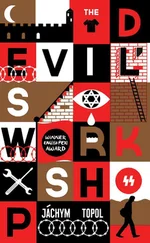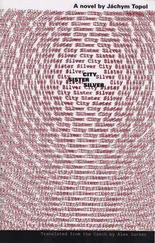I told Captain Yegorov what unit the dead belonged to after reading various papers taken from their pockets, and I translated their letters, but not quite in full because they began with things like My love, I’m thinking of you … or Hi Gran, I’m well … Captain Yegorov just waved them away. But we didn’t find any decent maps on the dead men.
And from the rasping transmitter in the tank and the radio receiver in the commander’s tent I gathered that the Bohemian Lion had roared and the entire land was in revolt.
After we were attacked for the first time by a regular army corps, gunners Kantariya and Timosha, accustomed to killing cowards in cottages, sank into contemplation. Gunner Timosha said he couldn’t understand how the Czechoslovak Army could take defensive action, betraying the armies of five nations of the Warsaw Pact, but Gunner Kantariya wasn’t one for moping around, and with a whistle and a snap of his fingers he started dancing on the tank’s front hull, as if to challenge the low, dismal clouds… Kantariya’s dancing was a challenge to the land of the Czechs and a warning as well… The tank crews cheered him on, but I couldn’t work out who had betrayed whom and where that left me. What would happen if I were spotted on the tank by, say, Mr Kropáček with his poaching piece or Mr Moravčík with his pistol? Who was that sniper we’d made mincemeat of? Was it someone I knew? And what would Dýha or Karel think if they could see me now? And I got the idea that from now on I would only look out at the world from my tank with my face blackened, and I was about to scoop up a handful of axle grease — a common subterfuge when you’re in a hostile alien environment — when I heard a voice I knew well coming from the tank’s radio down below, in between the whistling and crackling of the signal. And so, as swift as a weasel, I dropped inside the tank, and the clapping and whistling sub-machine-gunners who were still admiring Kantariya’s dancing didn’t find it at all odd: Ilya the interpreter was merely going about his work.
I dropped inside the tank and put on my headphones. The announcement — ‘ Hello, hello, Radio Free Siřem calling …’ — was followed by a terrible barrage of obscenities and profanities, many in Czech and many in Russian. It was Commander Žinka calling the people to arms and giving instructions on how to produce effective home-made weapons, as well as advice on the tactics of partisan warfare, including poisoning wells. He even talked about a scorched earth policy. Judging from the obscenities and profanities, I decided that Commander Žinka had not quite stuck to his pledge to give up alcohol, and I imagined Margash and me standing in front of Žinka with our knives down our trousers, still wet after washing off Vyžlata’s blood, while he assembled the Radio Free Siřem transmitter. And I remembered the depths of the cellar at the Home from Home and what lay there, and I told myself that because of the rebels who listened to Radio Free Siřem and ambushed us and tore down signs and demolished bridges, we couldn’t even get our tank column past Chapman Forest and leave Siřem far behind, and I was sorry that we, Margash and me, hadn’t managed to kill Žinka in the end.
And so we cruised the countryside. Sometimes Czech bandits blocked our way with barricades, and in some places that we had previously driven through unmolested we met with gunfire. We were indifferent by then to the crack of hunting rifles and poaching pieces, but more and more we were subjected to volleys of automatic fire, and on the lead tank Captain Yegorov was frowning.
Sometimes, even during our evening halt and with his boots already removed, Captain Yegorov would listen to Radio Free Siřem.
During Radio Free Siřem’s transmissions Captain Yegorov would drum his fingers on the top of the folding desk in the command tent, and I judged from his silence and the gloom that furrowed his imperious brow that the destruction of the Radio Free Siřem transmitter would make Captain Yegorov very happy.
But I didn’t want to go into Siřem! I’d been using my maps to direct the tank column away from Siřem — as far away as possible.
Reading maps and using the Czech language were part of my job description. I only abandoned my snug on the front hull of the tank during battle situations, provided there was time. I was small enough not to restrict the movement of the tank’s gun barrel, but I always wanted to be as far away from the cannon as possible. In battle situations I stuck close to the prudent Gunner Timosha and the roguish Gunner Kantariya, who never stopped cracking jokes, even in a blaze of shellfire. I was just following Captain Yegorov’s orders. In the calm of evening, inside the command tent, me and gunners Kantariya and Timosha would see to the needs of our commander.
Kantariya and Timosha also looked after the supply train. They had the drivers and crews of both pickups in the train under their command.
It was like this: every time we destroyed a pocket of Czech resistance, Kantariya and Timosha would drive out in the two pickups. They would load onto them kitchen clocks, rugs, stag statuettes, church plate, wall decorations, and also selected fancy crockery and anything else that Captain Yegorov requested.
Money, jewels, watches taken from the dead and various other small items were stuffed in sacks by Kantariya and Timosha. It all belonged to Captain Yegorov.
At night it was me who guarded the sacks, but I wasn’t allowed anywhere near the supply pickups. The two gunners made that plain from the outset. That was fine by me and I made no attempt to discover their secret. I had plenty of work of my own to do, thank you very much.
During that long succession of days, which were all much alike, I lived pressed tight to the tank’s armour plating, snuggling up to the iron like a beetle mimicking the bark of a tree, and no-one ever called me a ‘little bugger!’ or a ‘filthy beast!’ or ‘Avar!’ or a ‘poor slob!’ Nobody there ever spoke to me like that. Bullets from the sub-machine-gunners’ Kalashnikovs and the NCOs’ side arms would have killed them on the spot if they had. Our column carried massive quantities of weapons and supplies and fuel, and nobody could touch us.
My task was to report everything I knew about my field training to Captain Yegorov. I reported where signposts were. I knew in advance where we’d get sight of a church tower, where there could be snipers or valuables, and only I knew which way and how to get inside grain stores, where there could well be pockets of resistance.
In the tank column I alone knew that barns also have small doors through which insurgent Czechs could cut and run for the open, and I alone knew that the cellars under the village houses were often linked by passageways, and where to look for them.
Yet I sensed that soon we would have covered the entire area marked on my maps, and then what would happen? I didn’t want to go to Siřem. We trundled round and round in circles through the heart of Bohemia.
Commander Žinka and his Radio Free Siřem transmitter were to blame for that.
Following his instructions, people tore down the signposts and tried to lure our column into Chapman Forest with decoy fire.
We would come up to signposts and find them whitewashed out.
We criss-crossed villages and hamlets, and burnt down isolated farms with hostile people lurking in them, but nowhere were there any names for these villages, and the people we captured just shook their heads fearfully, and said in Russian, ‘Don’t know!’
In our entire column only I understood the Czech announcements that drifted our way from the loudspeakers in the villages just before we shot them to smithereens.
It was one of my jobs as interpreter to translate them.
Читать дальше












